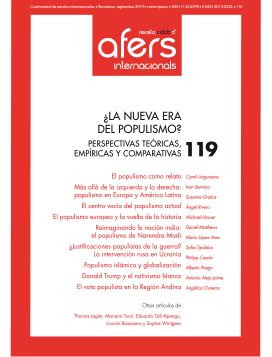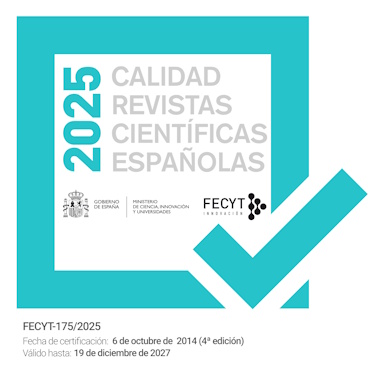The void centre of the contemporary populism: the antinomical constitution of the populist leader
Keywords:
populism, neoliberalism, fragmentation, multitude, Trump, PutinAbstract
Revista CIDOB d’Afers Internacionals, nº 119
Quadrimestral (Maig-September 2018)
ISSN:1133-6595 | E-ISSN:2013-035X
DOI: doi.org/10.24241/rcai.2018.119.2.63
Taking as reference points the populisms of Donald Trump and Vladimir Putin, this paper analyses the common inconsistencies in contemporary populist ideologies and strategies. It is argued that contemporary populism is linked to the “multitudinal social being”, defined here as the conjunction of two antinomical tendencies: neoliberal atomisation and a tendency towards communality. The multitudinal communities and their interrelations reveal inconsistencies and cleavages. The thesis posed by the article is that a populist leader reflects the inconsistencies and cleavages of the multitudinal communities and does not, therefore, create a coherent doctrine with a central idea. The populist leader is a protean Leviathan bringing inconsistent and decentralised doctrine forth from his or her stabilised place as a point of impossible unification.
>>The full text articles of this issue are available only in Spanish language
References
Balibar, Étienne. «Es Gibt Keinen Staat in Europa: Racism and Politics in Europe Today». New Left Review, vol. 186, n.º 1 (1991), p. 5-19.
Benkler, Yochai. The Wealth of Networks. How Social Production Transforms Markets and Freedom. New Haven, Londres: Yale University Press, 2006.
Brown, Wendy. Undoing the Demos: Neoliberalism’s Stealth Revolution. Nueva York: Zone Books, 2015.
Cooper, Betsy; Cox, Daniel; Lienesch, Rachel y Jones, Robert P. «Anxiety, Nostalgia, and Mistrust: Findings from the 2015 American Values Survey». PRRI (17 de noviembre de 2015) (en línea) https://www.prri.org/research/survey-anxietynostalgia-and-mistrust-findings-from-the-2015-american-values-survey/
Debord, Guy. Society of the Spectacle. Londres: Aldgate Press, 2005.
Filipov, David. «Putin can’t seem to find a “national idea” for Russians, so he’s proposing a law to do it». The Washington Post, 5 de noviembre de 2016, (en línea) [Fecha de consulta: 23.03.2018] https://www.washingtonpost.com/world/putin-cant-seem-to-find-a-national-idea-for-russians-so-hes-proposing-alaw-to-do-it/2016/11/05/1fba53d2-a1d5-11e6-8864-6f892cad0865_story.
html?utm_term=.2e2a6845ef9a
Fink, Bruce. The Lacanian Subject: Between Language and Jouissance. Princeton: Princeton University Press, 1996.
Flecha, Ramón; de Botton, Lena; Santa Cruz, Iñaki y Claveria, Julio Vargas. «Equality of Differences versus Postmodern Racism». En: Macedo, Donaldo y Gounari, Panayota (eds.). The Globalization of Racism. Nueva York: Routledge, 2005, pp. 226-240.
Foster, Belamy. «Neofascism in the White House». Monthly Review, 1 de abril de 2017 (en línea) [Fecha de consulta: 23.03.2018] https://monthlyreview.org/2017/04/01/neofascism-in-the-white-house/
Gómez-Reino, Margarita y Llamazares, Iván. «Left Populism in Spain? The Rise of Podemos». Conferencia «Solving the Puzzle of Populism», Brigham Young University, 2015.
Hardt, Michael y Negri, Antonio. Multitude. War and Democracy in the Age of Empire. Nueva York: The Penguin Press, 2004.
Hauser, Michael. «Metapopulism in-between democracy and populism. Tranformations of Laclau´s concept of populism with Trump and Putin». Distinktion: Journal of Social Theory, vol. 19, n.º 1 (2018), p. 68-87.
Ingelhart, Ronald y Norris, Pipa. «Trump, Brexit and the Rise of Populism: Economic Have-Nots and Cultural Backlash». Harvard Kennedy School, Faculty Research Working Series, n. º RWP 16-026 (en línea) [Fecha de consulta: 15.06.2016]
https://research.hks.harvard.edu/publications/workingpapers/Index.aspx
Liptak, Kevin y Zeleny, Jeff. «Trump pledges to “make America great again for all Americans”». CNN Politics, 31 de enero de 2018 (en línea) https://edition.cnn.com/2018/01/30/politics/state-of-the-union-2018/index.html
Lütjen, Torben. «As people “sort” themselves, consequences for democracy». Journal Sentinel, 25 de diciembre de 2012 (en línea) http://archive.jsonline.com/news/opinion/as-people-sort-themselves-consequences-for-democracydq818lu-184769081.html/
Masyuk, Elena. «What Putin is most afraid of is to be left out. Interview with Gleb Pavlovskiy». Novaya Gazeta, 12 de noviembre de 2011 (en línea) [Fecha de consulta: 21.09.2016] https://www.en.novayagazeta.ru/politics/55288.html
Montag, Warren. «Who Is Afraid of the Multitude? Between the Individual and the State». The South Atlantic Quarterly, vol. 104, n.º 4 (2005), p. 655-673.
Negri, Antonio. «Approximations: Towards an Ontological Definition of the Multitude». Generation website, 2002 (en línea) [Fecha de consulta 15.7.2017] http://www.generation-online.org/t/approximations.htm
Parenti, Christian. «Listening to Trump». Jacobin Magazin, 22 de noviembre de 2016 (en línea) [Fecha de consulta 30.8.2017] https://www.jacobinmag.com/2016/11/trump-speeches-populism-war-economics-election/
Perrin, Andrew. «Social Media Usage: 2005-2015». Pew Research Center, 8 de octubre de 2015 (en línea) [Fecha de consulta 11.12.2017] http://www.pewinternet.org/2015/10/08/social-networking-usage-2005-2015/
Phillips, Amber. «A shortlist of economic issues on which Donald Trump sounds more like a Democrat than a Republican». The Washington Post, 8 de agosto de 2016 (en línea) https://www.washingtonpost.com/news/the-fix/wp/2016/08/08/a-shortlist-of-economic-issues-on-which-donald-trumpsounds-more-like-a-democrat-than-a-republican/?utm_term=.cfb7d4ae7401
Pomerantsev, Peter. «Non-Linear War». London Review of Books, 28 de marzo de 2014a (en línea) [Fecha de consulta 11.12.2017] http://www.lrb.co.uk/blog/2014/03/28/peter-pomerantsev/non-linear-war/
Pomerantsev, Peter. «The Hidden Author de Putinism». The Atlantic, 7 de noviembre de 2014b (en línea) [Fecha de consulta 11.12.2017] http://www.theatlantic.com/international/archive/2014/11/hidden-author-putinismrussia-vladislav-surkov/382489/
Rothwell, Jonathan y Diego-Rosell, Pablo. «Explaining nationalist political views: The case of Donald Trump». SSRN website, 2 de noviembre de 2016 (en línea) [Fecha de consulta 23.3.2018] https://papers.ssrn.com/sol3/papers.cfm?abstract_id=2822059
Standing, Guy. Work after Globalization: Building Occupational Citizenship. Cheltenham: Edward Elgar, 2009.
Standing, Guy. The Precariat: The New Dangerous Class. Londres: Bloomsbury Academic, 2011.
Suls, Rob. «Less than half the public views border wall as an important goal for U.S. immigration policy». Pew Research Center, 6 de enero de 2017 (en línea) http://www.pewresearch.org/fact-tank/2017/01/06/less-than-half-thepublic-views-border-wall-as-an-important-goal-for-u-s-immigration-policy/
Taggart, Paul. «New Populist Party in Western Europe». West European Politics, vol. 18, n. º 1 (1995), p. 34-51.
Taggart, Paul. Populism. Buckingham: Open University Press, 2000.
Tamás, Gáspár, M. «On Post-fascism: The Degradation of Universal Citizenship». Boston Review, 1 de junio de 2000 (en línea) [Fecha de consulta 23.3.2018] http://bostonreview.net/world/g-m-tam%C3%A1s-post-fascism
Timm, Jane C. «The 141 Stances Donald Trump Took During His White House Bid». NBC News, 28 de noviembre de 2016 (en línea) https://www.nbcnews.com/politics/2016-election/full-list-donald-trump-s-rapidly-changingpolicy-positions-n547801
Traverso, Enzo. «Trump´s Savage Capitalism: The Nightmare is Real». World Policy Journal, vol. 34, n.º 1 (2017), p. 13-17.
Vermeulen, Timotheus y van den Akker, Robin. «Notes on Metamodernism». Journal of Aesthetics and Culture, vol. 2, n.º 1 (2010) (en línea) [Fecha de consulta 11.12.2017] http://www.tandfon-line.com/doi/full/10.3402/jac.v2i0.5677
Wang, Zheng; Tchernev, John M. y Soloway, Tyller. «A dynamic longitudinal examination of social media use, needs, and gratification among college students». Computers in Human Behaviour, vol. 28, n.º 5 (2012), p. 1.829-1.839.
Whitebook, Joel. «Trump´s Method, Our Madness». The New York Times, 20 de marzo de 2017 (en línea) [Fecha de consulta 11.12.2017] https://www.nytimes.com/2017/03/20/opinion/trumps-method-our-madness.html?action=click&pgtype=Homepage&clickSource=story-heading&module=opinionc-col-right-region®ion=opinion-c-col-right-region&WT.nav=opinion-ccol-right-region&_r=1
Zsolt, Enyedi y Deegan-Krause, Kevin (eds.). The Structure of Political Competition in Western Europe. Nueva York: Routledge, 2011.
Žižek, Slavoj. The Tiklish Subject: The Absent Centre of Political Ontology. Londres - Nueva York: Verso, 1999.













